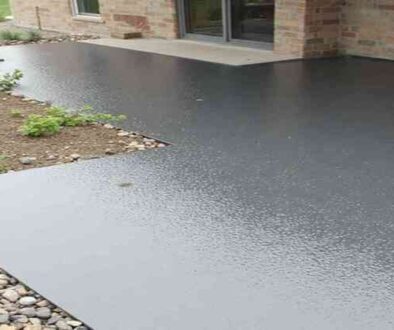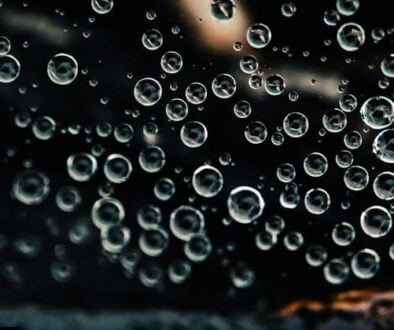Top 21 FAQ: Concrete Sealers for Driveways, Patios, and More!

Last updated on March 23rd, 2022
How long does a sealer last on stamped concrete?
In general, a basic quality acrylic film-forming sealer can last from 1 to 3 years. Whereas, a basic quality polyurethane or epoxy sealer can last from 5 to 10 years. Also, penetrating sealers, including Silane, Silane/Siloxane blends, or Siliconates can generally last for 5 to 10 years, whereas pure Siloxanes tend to last less.
Can I apply an acrylic sealer over concrete already sealed with a penetrating sealer?
It depends on the surface, chemical composition of both sealers, and the type of products that you are using. In general, if the penetrating sealer is solvent based, you should not use a water based film-forming acrylic sealer on top.
Whereas, you can use a solvent based acrylic on a concrete already sealed with solvent based penetrating sealer in some cases. For instance, if the surface is rough or porous enough and the silicate concentration is not very high, you can use an acrylic sealer. However, it is important to do a test on a small area first.
In addition, it is best to refer to the supplier or manufacturer, since there are products that are compatible and suitable for this purpose.
Can minor oil leaks from my car on the concrete driveway ruin the acrylic sealer?
Of course, oil leaks can certainly affect the performance of an acrylic sealer, reduce its lifespan, and can even stain. In fact, hot oil can eventually soften the sealer much faster and consequently reach and stain the concrete.
Why you do not recommend epoxy concrete sealers for driveways or pool decks?
There are two main reason why we do not recommend epoxy film-forming concrete sealers for driveways or for any exterior application. Usually, most epoxy sealers are not UV stable, and can turn yellow with time. In addition, they are not breathable and can entrap moisture. However, some relatively new special epoxies can be UV resistant to some extent and breathable.
Can i apply one thick coat of acrylic sealer instead of two thinner coats?
No. In general, applying a single thick coat of acrylic sealers instead of two thinner ones is a bad practice. This can cause several problems such as the formation of surface bubbles. It is best to follow the product specifications to ensure an adequate consumption rate and film thickness.
What are the best concrete sealers for driveways?
In brief, the best concrete sealers for driveways are “generally” penetrating sealers and not film-forming sealers.
Driveways are usually exposed to weather conditions, tire loads, abrasion, hot oil, salts, and various chemicals. Thereby, choosing the right sealer is vital! However, choosing the “best” type of sealer for a specific application depends on the quality of concrete, desired appearance, budget, weather and exposure conditions, etc… . And in this case, the advantages lie in the fact that penetrating sealers usually provide a longer lifespan, better durability, do not affect the slipperiness of the surface, and do not wear and tear like film-forming sealers. You can also find a more detailed answer to this question in this article, “Which Concrete Sealers are Best for Patios, Driveways, Pool Decks, and Garages“.
What are the best sealers for concrete countertops?
It depends. In fact, various factors play a major role in choosing the “best” sealer for concrete countertops. These include personal aesthetic preferences, safety, location, exposure, etc… .
Generally, most people prefer a more natural finish for a concrete countertop rather than a glossy, highly-polished, “plasticky” effect. For this reason, the most popular manufacturers of concrete countertops often use penetrating sealers on two or more coats, and not film-forming sealers.
However, penetrating sealers are usually stain-resistant and not stain-proof, especially when dealing with food stains, acids, alcohol, and others. In this case, film-forming sealers often provide higher stain-resistance than penetrating sealers. Hence, some other popular manufacturers use a combination of penetrating sealers and film-forming sealers in a way that does not significantly affect the natural appearance of concrete, although film-forming sealers are more prone to scratching and peeling.
In addition to sealers, countertops are also treated with wax as a final coat. Finally, it is important to use only food-safe products on kitchen countertops.
You can learn more about sealers for concrete countertops in the following article, “The Best Sealers for Concrete Countertops: All You Need To Know“.
What are the best concrete patio sealers?
The answer is, it depends. Choosing the “best” concrete patio sealer depends on the design, finish, exposure conditions, personal aesthetic preference, safety, etc… .
In brief, if you prefer a natural look without changing the appearance of the concrete patio, a penetrating type of sealer is the best choice. This type does not affect the surface slipperiness and appearance. Also, it often provides good durability in various exposure conditions.
However, if you prefer a “wet look” finish that is usually budget-friendly and easy to apply, an acrylic film-forming sealer is the way to go. In fact, solvent based acrylic sealers are the most commonly used on concrete patios.
You can learn how to choose the ideal sealer for concrete floors in the following article, “How to Choose the Best Sealers for Concrete Floors“.
What are the best stamped concrete sealers?
There is no “best” sealer for a stamped concrete application in general. Each application has an ideal choice based various controlling factors.
However, you can find out about the best acrylic sealers for stamped concrete in the following article, “The Best Acrylic Sealers for Stamped Concrete: All You Need To Know“.

What are the best concrete sealers for basements?
In general, a penetrating sealer is the best type of sealers for a basement. However, as previously mentioned, there are various controlling factors to choose the ideal sealer. In addition, it is important to consider the sealer’s breath-ability, and to determine whether there is a hydro-static water pressure, and whether a vapor barrier was initially used. In brief, most penetrating sealers perform better than film-forming sealers in such conditions.
What are the best exposed aggregate concrete sealers?
Generally, most people prefer to give the exposed aggregate a glossy finish to enhance and enrich its colors. Hence, usually a film-forming sealer is the best choice. In fact, an acrylic sealer is the most common choice on exposed aggregate concrete. However, as we previously explained, various factors determine the ideal choice of the sealer for a specific application. Nevertheless, if you prefer to preserve the natural look of the exposed aggregate concrete, a penetrating sealer is also suitable.
Are there colored concrete sealers?
Yes. Tinted concrete sealers and even separate tints or pigments for concrete sealers are available in the market. However, it is important when buying a separate tint to check for its compatibility with the sealer. Both water based and for solvent based sealers can be tinted.
What are the popular concrete sealer colours?
Tinted concrete sealers are usually available in a wide range of colors, with the most popular being black, charcoal, golden-brown, and terracotta.
How to seal concrete driveways with acrylic?
Sealing a concrete driveway is not a complex process, however it should be properly executed in order to avoid common issues.
Considering a newly poured concrete driveway:
Note: Some contractors use the cure and seal products, however the following procedure covers the application of a separate acrylic sealer.
- First, after at least 28 days of pouring, wash and clean the surface thoroughly from any dirt and loose particles.
Note: if any acidic solution or stain is used on the concrete, it is important to neutralize the surface. - Second, after the surface has dried enough, usually to a moisture content less than 5%, apply the sealer evenly with thin coats, using a roller or a sprayer.
Note: It is important to check the product specification for the ideal consumption rate and film thickness.
What are the best sprayers for concrete sealers?
Airless sprayers are generally the best type of sprayers which are suitable for both water based and solvent based concrete sealers. These sprayers are perfect for providing a constant rate of low pressure and a high volume to cover large areas in a short time.
What are concrete penetrating sealers?
Concrete penetrating sealers are chemicals that penetrate and react to provide a good protection against stains, water ingress, chemicals, freeze and thaw cycles, etc… . However, unlike film-forming sealers, penetrating sealers usually do not affect the appearance of concrete and do not form a film on the concrete surface. You can learn more about the classification and different types of penetrating sealers in the following article, “The Major Types of Sealers for Concrete“.
Do concrete sealers protect concrete from stains?
Concrete sealers and stains:
Most concrete sealers, whether being film-forming or penetrating, provide a good resistance against stains. In general, most film-forming sealers are more stain resistant than penetrating sealers.
Do all concrete sealers give the wet look effect?
Usually, film-forming sealers give the wet look effect or the glossy finish. However, some penetrating sealers can also give some gloss to your concrete surface.
How to remove concrete sealers?
You can remove film-forming sealers either mechanically or chemically. The former method is based on grinding, blasting, or sanding the surface. Whereas, the latter methods involves the application of a chemical stripper which reacts with the sealer to eventually remove it.
However, penetrating sealers are often harder to remove and can sometimes be almost impossible to totally remove them. The method of removal depends on the type of penetrating sealer and on the penetration depth.
What are silicate concrete sealers?
Silicates are namely densifiers and surface hardeners. They penetrate and react with free lime to produce crystals. This process increases the strength of the surface and reduces the permeability of concrete.
How often to seal a concrete driveway?
It depends on the type of sealer, quality of the sealer, weather and exposure conditions, etc… . But generally, on a concrete driveway, a basic acrylic sealer can last up to 2 years, polyurethane up to 5 years, and a silane/siloxane based penetrating sealer up to 7 years. However, it is best to check the product’s specifications, since they can vary significantly.




